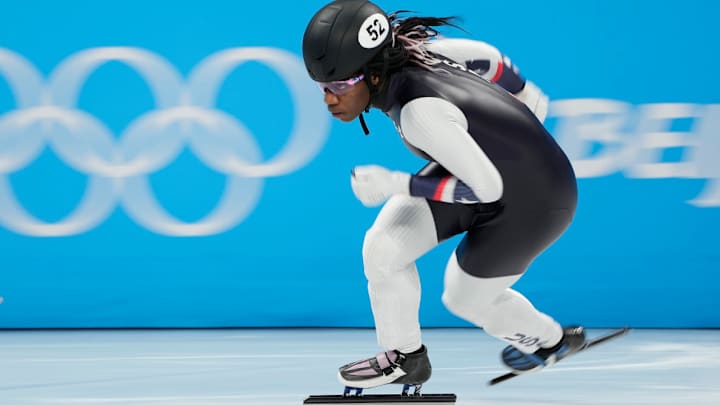Maame Biney’s Alter Ego Gives Her a Competitive Edge and a Clear, Calm Mind

BEIJING — Maame Biney glides to the line, pulls her skates perpendicular, crouches in anticipation of the starting gun—and disappears. In her place is Anna Digger, rocketing around the speedskating track, slicing past opponents, glaring at everyone. Five hundred meters later, Anna crosses the line and goes right back to being Maame.
“Me, Maame, personally, I'm a very chill, laidback kind of person,” Biney says. “I think lazy would be the right word for it. I'm quite lazy. I don’t really want to do anything. I just want to sit on the couch and watch TV. But then Anna, she's very, like, focused and really wants to get the work done.”
Biney, 22, does not have dissociative identity disorder. But she does suffer from anxiety, and over the past few years, she has found that the most effective remedy is to imagine herself as two people: Maame Biney, who sometimes becomes overwhelmed by the prospect of trying to win an Olympic gold medal, and Anna Digger, who does not.
“My heart just races so much, and I get super nervous,” Biney says. “I get to the point where I can’t even think about skating anymore. It’s not skating-focused. And then channeling Anna, I’m able to process that energy into skating and not into those anxious thoughts.”
The name stems from an email address she created as an eight-year-old; the idea stems from a comment teammate Kristen Santos made in 2017. You look like a different person when you skate, she said. You should imagine you are a different person.
Biney loved the concept immediately. She picked up skating as a six-year-old, shortly after she and her father, Kweku, immigrated from Ghana to the suburbs of Washington, D.C. Kweku had seen an advertisement for a local rink and signed his daughter up. The instructor soon proclaimed her too fast for figure skating and suggested short track.
And Biney has been going fast ever since. She made the 2018 Olympic team as a high school senior; she finished 14th in the 500 meters and 31st in the 1,500 meters in PyeongChang. But she found the media crush there unsettling: Everywhere she went, someone asked her about being the first Black woman to represent the United States in short track at the Olympics. Coupled with her performance anxiety, she often struggled to find the enthusiasm that initially drew her to the rink.
Over the past few years, she says, she has considered “many times” whether she wants to keep skating. “It’s not worth crying and stressing,” she says. “This is a small portion of my life. … But then I think about it, and I’m like, This is what I do, and this is exactly what I'm meant to do with my life, and I enjoy doing it.” She estimates that she spends 20% of her time feeling anxious and the other 80% feeling joyful.
She has leaned on meditation, therapy and journaling, and all three have helped. But she still feels those race-day nerves. So, she turns to Anna.
Anna is brave. Anna is strong. Anna is fearless. Maame loves Anna. But as Maame gets older, she is beginning to wonder why Maame and Anna have to be two separate people. Maame does not like talking about herself, and framing her skating persona—the one everyone is asking about—as another person helps her deflect some of that spotlight. “It allows me to brag about it without actually being myself when I’m bragging,” she says.
But there’s more to it than that. Maame does not just want to deflect the spotlight onto Anna when other people are looking—like when she competes on the Olympic stage here. Maame does it when she is looking at herself, too. Brave, strong, fearless: those are big ideas. If she thinks about it, Maame realizes she is not afraid that Anna is those things and Maame is not. She is realizing, even if reluctantly, that Anna is those things—and Maame is too.
“I think something that I would love to do with Anna is definitely channel her inner, like, outspokenness,” Biney says. “Being confident in herself. Oh, that's something that I definitely want to explore more: being confident within myself. My personality and my body and my beautifulness. And that doesn't necessarily have to do with skating.”
Turning Maame into Anna is just the kind of thing Anna would do. Maybe it’s also the kind of thing Maame would do.
More Winter Olympics Coverage:
• U.S. Figure Skating Isn’t Too Concerned About Falling Short in the Team Event
• Extreme Weather Shows That Even These Olympics Will Have Unpredictable Moments
• Polish Luger Overcomes Gruesome Injury to Compete at Olympics

Stephanie Apstein is a senior writer covering baseball and Olympic sports for Sports Illustrated, where she started as an intern in 2011. She has covered 10 World Series and three Olympics, and is a frequent contributor to SportsNet New York's Baseball Night in New York. Apstein has twice won top honors from the Associated Press Sports Editors, and her work has been included in the Best American Sports Writing book series. A member of the Baseball Writers Association of America who serves as its New York chapter vice chair, she graduated from Trinity College with a bachelor's in French and Italian, and has a master's in journalism from Columbia University.
Follow stephapstein